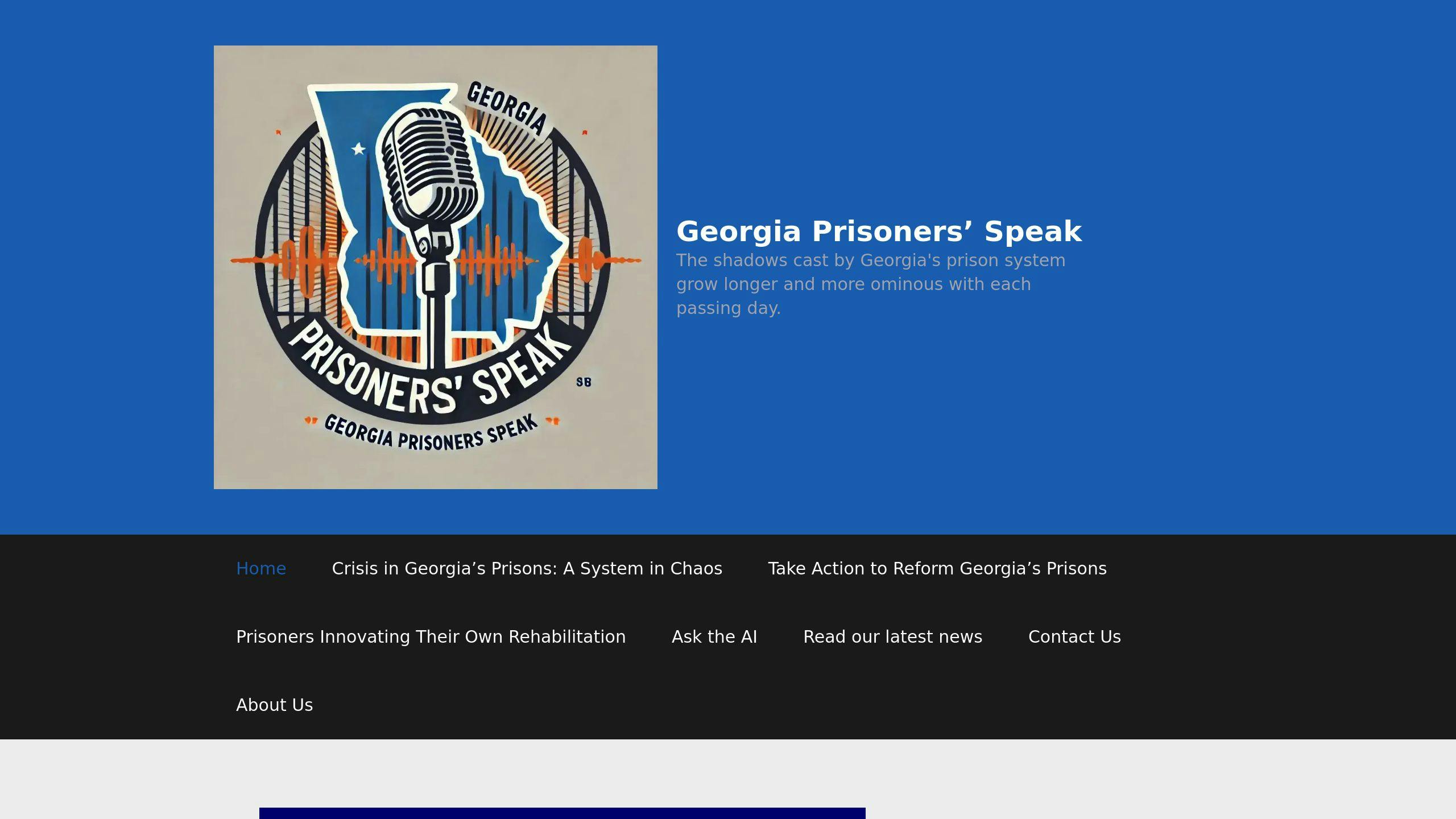Georgia’s prisons face critical issues – violence, corruption, and lack of transparency – that demand urgent reform. Independent investigations have proven to be a powerful tool for addressing these systemic failures. Here’s why they matter:
- Unbiased Oversight: Third-party reviews expose hidden problems like understaffing, violence, and organized crime.
- Transparency: They document unreported incidents and hold systems accountable.
- Actionable Reforms: Provide clear recommendations and timelines for change.
In 2023, 35 homicides were documented in Georgia prisons, but poor record-keeping suggests the real number is higher. The Department of Justice’s investigation highlighted severe understaffing, constitutional violations, and over 350 staff linked to illegal activities. Advocacy groups like Georgia Prisoners’ Speak (GPS) work alongside these investigations to push for necessary reforms.
The solution? Independent oversight with real authority to ensure transparency, accountability, and safer prison conditions.
Key Problems in Georgia Prisons
Corruption and Abuse in the System
Georgia’s prison system struggles with widespread corruption, with more than 350 staff members linked to illegal activities like contraband smuggling [3]. This issue directly fuels violence and organized crime within the facilities. Drug trafficking networks involving both staff and inmates not only heighten organized crime but also jeopardize prison security, making the environment increasingly dangerous. According to a Department of Justice investigation, the Georgia Department of Corrections (GDC) has failed to enforce basic security measures, such as routine inmate counts, which allows gangs to dominate many facilities [4][6].
"The State is deliberately indifferent to these unsafe conditions", the U.S. Department of Justice report states [6], underscoring the severity of the problem and the institutional neglect in addressing these challenges.
How Lack of Transparency Blocks Reform
Corruption is only part of the problem – lack of transparency ensures these issues remain buried and unresolved. For instance, inadequate death reporting has led to underreported fatalities, with only 35 homicides officially documented in 2023, a number likely far lower than the actual figure [6]. Poor record-keeping further obscures patterns of violence and abuse, while restricted access for external monitors hampers oversight and investigations.
The DOJ’s investigation revealed the depth of this transparency crisis, issuing 82 recommendations with a tight 49-day deadline for response [6]. The lack of transparency directly undermines efforts to:
- Investigate and track incidents of violence and abuse
- Monitor and address staff misconduct
- Ensure compliance with constitutional standards
- Develop and implement meaningful reforms
BT, a spokesperson for Georgia Prisoners Speak, criticized the system’s "strategic indifference", describing it as a deliberate effort to maintain the current state of affairs rather than pursue meaningful change [5].
Without clear reporting systems and independent oversight, uncovering and resolving these issues becomes nearly impossible. Effective reforms will require external monitoring and accountability to bring hidden problems to light.
The Role of Third-Party Investigations in Fixing These Issues
Independent Oversight Without Bias
Third-party investigations bring an unbiased perspective to Georgia’s prison system by relying on external reviewers who have no connections to the correctional institutions. This separation allows for objective evaluations, free from the pressures and influences of the system itself.
A clear example is the DOJ’s 2021 investigation, where investigators documented violations and suggested reforms without interference [2].
Thorough Examination of Prison Conditions
Using the DOJ’s investigative framework, the table below highlights specific methods employed to uncover systemic problems. These approaches ensure that every aspect of prison conditions is carefully examined, leaving no stone unturned [9][4].
| Method | Findings |
|---|---|
| On-site Inspections | Documented safety issues and constitutional violations |
| Document Reviews | Exposed patterns of misconduct and systemic failures |
| Prisoner Interviews | Revealed unreported incidents and ongoing abuse |
| Staff Interviews | Highlighted staffing shortages and security gaps |
These methods not only expose critical failures but also provide a foundation for actionable reforms.
"People are assaulted, stabbed, raped, and killed or left to languish inside woefully understaffed facilities." – Assistant Attorney General Kristen Clarke, Justice Department’s Civil Rights Division [9]
Pushing for Accountability and Change
Third-party investigations play a key role in driving reform by delivering concrete evidence. The DOJ’s findings of Eighth Amendment violations and severe understaffing have forced Georgia officials to address these issues under the threat of legal consequences [9][4].
These investigations establish timelines, offer clear recommendations, and monitor progress to ensure accountability. The Federal Prison Oversight Act enhances this process by requiring congressional reporting and defining response protocols [8]. For Georgia, implementing similar measures could help maintain accountability and prevent future violations. This structured approach demonstrates how external investigations can lead to meaningful and lasting change.
Related video from YouTube
sbb-itb-7858f51
How Georgia Prisoners’ Speak (GPS) Supports Reform

Georgia Prisoners’ Speak (GPS) plays a key role in improving oversight of Georgia’s prison system by documenting and shedding light on systemic problems. For example, their 2020 grievance campaign collected over 120 formal complaints about food shortages. This, combined with their ongoing weekly monitoring, has revealed patterns of abuse that independent investigators can later confirm [5].
The group focuses on gathering evidence related to violence, constitutional breaches, staff misconduct, and poor facility conditions. This information has been especially helpful in supporting the Department of Justice’s investigation into the state’s prison system [6].
GPS doesn’t stop at collecting evidence – they actively work with advocacy groups and journalists to expose wrongdoing and advocate for change. They also provide tools like educational guides, templates for contacting representatives, and resources for reporting prison issues, empowering citizens to demand reforms [5].
Their partnerships with investigative journalists have been particularly impactful. For instance, their collaboration with the Atlanta Journal-Constitution revealed deep-rooted corruption among prison staff and widespread contraband issues [7].
Why Third-Party Investigations Matter for Oversight
Third-party investigations play a key role in improving prison oversight by offering impartial and detailed evaluations of systemic problems.
Building Transparency and Trust
Independent investigations help rebuild public trust in prison oversight by providing clear and unbiased evaluations of conditions and practices. For instance, the Federal Prison Oversight Act requires inspections and reporting, showcasing how independent oversight can work effectively [8]. A notable example is the Department of Justice’s (DOJ) investigation into Georgia prisons, which relied on thousands of records and interviews to expose hidden issues.
"The State is deliberately indifferent to these unsafe conditions" [6]
These investigations ensure accurate documentation of incidents and violations, laying the groundwork for real change. By promoting transparency, they hold institutions accountable and bolster the efforts of advocacy groups pushing for reform.
Supporting Advocacy Efforts Like GPS
Third-party investigations provide crucial evidence and analysis that amplify the work of advocacy organizations like GPS.
Some ways these investigations strengthen reform efforts include:
- Documenting violations: Supplies verified evidence for advocacy campaigns.
- Offering official recommendations: Establishes clear, actionable reform goals.
- Providing independent verification: Confirms concerns raised by advocacy groups.
The DOJ’s findings, for example, give advocacy groups authoritative evidence to drive reform campaigns. When independent investigations align with the work of advocacy groups, it becomes much harder for prison authorities to ignore or downplay systemic problems. This collaboration has been especially effective in Georgia, where the DOJ’s investigation has reinforced and elevated the concerns raised by advocacy organizations [4][6].
Conclusion: The Path Forward for Prison Oversight
Investigations by independent organizations have highlighted major problems within Georgia’s prison system, making it clear that ongoing oversight is essential. These reports stress the importance of putting effective oversight measures in place to address systemic issues.
Legislation like S.1401 at the federal level and state plans, such as Sen. Randy Robertson’s proposal for an oversight committee, aim to create consistent standards and improve accountability within prisons [1][2]. The Department of Justice (DOJ) has also weighed in, offering 82 recommendations to address staffing shortages, boost transparency, and improve how violence is investigated [6].
Progress can be tracked through measurable results, such as fewer violent incidents and more accurate reporting. With 35 documented deaths in Georgia prisons in 2023 alone – likely an undercount due to poor records – there’s a clear need for change [6].
Independent investigations play a key role in backing these reforms, holding all parties accountable and ensuring transparency throughout the process. By fostering collaboration among oversight bodies, advocacy groups, and prison administrators, Georgia has the opportunity to build a more accountable and transparent prison system. Keeping the focus on transparency and implementing systemic changes will allow these investigations to continue driving real improvements in prison conditions and accountability.
